转基因英语作文
转基因食品利弊作文英语

转基因食品利弊作文英语英文回答:Genetically modified (GM) foods, also referred to as genetically engineered (GE) foods, have sparked considerable debate due to their potential benefits and risks.Benefits of GM Foods:Increased crop yields: GM crops can be engineered to resist pests and diseases, reducing crop losses and increasing overall yield. This can help address food security concerns in developing countries.Improved nutritional value: GM foods can be enhanced to contain higher levels of vitamins, minerals, and other nutrients. This has the potential to combat malnutrition and improve public health.Resistance to environmental stressors: GM crops can be engineered to tolerate drought, heat, and other environmental stressors. This can increase agricultural productivity in challenging environments and reducereliance on synthetic fertilizers and pesticides.Risks of GM Foods:Health concerns: Critics argue that the long-term health effects of consuming GM foods are not fully understood. Concerns include potential allergies, increased toxicity, and antibiotic resistance due to the insertion of foreign genes.Environmental impact: GM crops can cross-pollinate with non-GM varieties, potentially introducing novel genes into natural ecosystems. This raises concerns about unintended consequences on biodiversity and gene flow.Economic issues: The development and commercialization of GM seeds can involve significant intellectual property rights and control by biotechnology companies. This cancreate concerns about farmer autonomy and market competition.Weighing the Benefits and Risks:The debate over GM foods is complex and requirescareful consideration of the potential benefits and risks. While GM foods have the potential to address food security and improve nutrition, concerns about health and environmental impacts must be thoroughly evaluated through rigorous scientific research and oversight.中文回答:转基因食品利弊。
转基因 英语作文
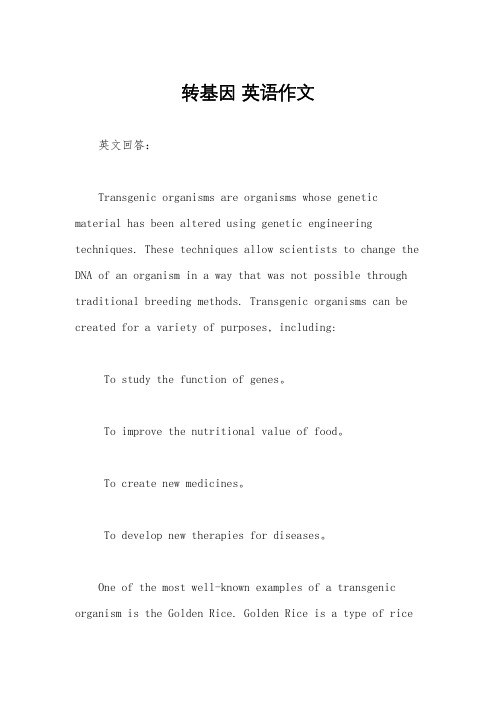
转基因英语作文英文回答:Transgenic organisms are organisms whose genetic material has been altered using genetic engineering techniques. These techniques allow scientists to change the DNA of an organism in a way that was not possible through traditional breeding methods. Transgenic organisms can be created for a variety of purposes, including:To study the function of genes。
To improve the nutritional value of food。
To create new medicines。
To develop new therapies for diseases。
One of the most well-known examples of a transgenic organism is the Golden Rice. Golden Rice is a type of ricethat has been genetically modified to produce beta-carotene, a precursor to vitamin A. Vitamin A deficiency is a major public health problem in many developing countries, and Golden Rice has the potential to help address this problem.Another example of a transgenic organism is the Bt cotton. Bt cotton is a type of cotton that has been genetically modified to produce a protein that is toxic to bollworms. Bollworms are a major pest of cotton crops, and Bt cotton can help to reduce the need for pesticides.Transgenic organisms have the potential to provide a number of benefits to society. However, there are also some concerns about the use of transgenic organisms. Some people worry that transgenic organisms could have unintended consequences for the environment or human health. It is important to carefully weigh the risks and benefits of transgenic organisms before making a decision about whether or not to use them.中文回答:转基因生物是指采用基因工程技术改变其遗传物质的生物。
有关转基因食品英文作文

有关转基因食品英文作文英文:Transgenic food has been a controversial topic for many years. Some people believe that it is a solution to the world's food shortage, while others argue that it poses a threat to human health and the environment. In my opinion, the use of genetically modified organisms (GMOs) in food production should be approached with caution.On the one hand, GMOs can increase crop yields and reduce the use of pesticides, which can benefit farmers and consumers. For example, the cultivation of Bt cotton, which is genetically modified to produce a toxin that kills bollworms, has led to a significant reduction in pesticide use in India. In addition, the use of GMOs in food production can help to address malnutrition by fortifying crops with essential vitamins and minerals.On the other hand, there are concerns about the safetyof GMOs. Some studies have suggested that they may have harmful effects on human health, such as allergies and antibiotic resistance. In addition, the use of GMOs may have unintended consequences for the environment, such as the development of superweeds that are resistant to herbicides. Furthermore, the use of GMOs may have economic and social implications, such as the concentration of power in the hands of a few multinational corporations that control the patents on GMO seeds.In conclusion, while GMOs have the potential to address some of the world's food challenges, their use should be carefully evaluated and regulated to ensure that they are safe for human health and the environment. Consumers should also have the right to know whether the food they are eating contains GMOs, so that they can make informed choices about what they eat.中文:转基因食品是一个多年来备受争议的话题。
转基因 英语作文
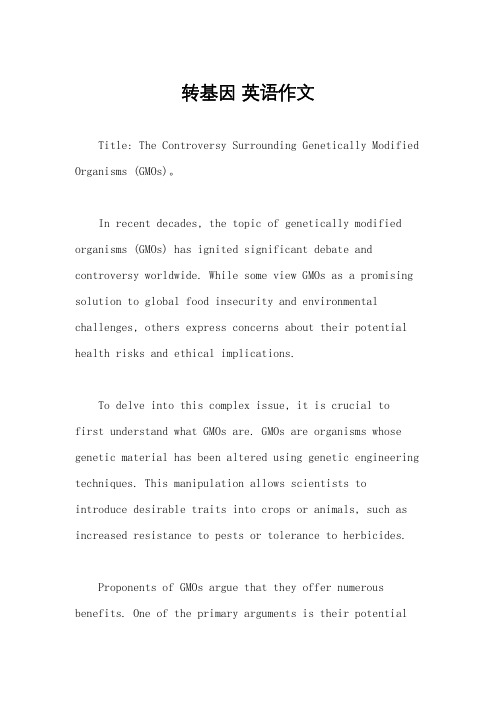
转基因英语作文Title: The Controversy Surrounding Genetically Modified Organisms (GMOs)。
In recent decades, the topic of genetically modified organisms (GMOs) has ignited significant debate and controversy worldwide. While some view GMOs as a promising solution to global food insecurity and environmental challenges, others express concerns about their potential health risks and ethical implications.To delve into this complex issue, it is crucial tofirst understand what GMOs are. GMOs are organisms whose genetic material has been altered using genetic engineering techniques. This manipulation allows scientists to introduce desirable traits into crops or animals, such as increased resistance to pests or tolerance to herbicides.Proponents of GMOs argue that they offer numerous benefits. One of the primary arguments is their potentialto increase agricultural productivity and food security. By creating crops that are more resistant to pests, diseases, and environmental stressors, GMOs have the potential to yield higher harvests, particularly in regions prone to drought or other adverse conditions. Additionally, GMOs can help reduce the need for harmful chemical pesticides and herbicides, thereby mitigating environmental damage.Moreover, GMOs hold promise for addressing specific nutritional deficiencies. For example, biofortified GMO crops can be engineered to contain higher levels of essential vitamins and minerals, potentially combating malnutrition in vulnerable populations.However, despite these perceived benefits, GMOs remain a contentious issue, primarily due to concerns about their safety and long-term effects. Critics argue that the process of genetic modification can lead to unintended consequences, such as the creation of new allergens or toxins. Additionally, there are fears that GMOs may negatively impact biodiversity by promoting monoculture and reducing the genetic diversity of crops.Furthermore, ethical considerations surround the commercialization and control of GMOs. Critics express unease about the dominance of large biotechnology corporations in the production and distribution of genetically modified seeds. They argue that this concentration of power could exacerbate socioeconomic inequalities and undermine the rights of farmers, particularly in developing countries.The debate over GMOs is further complicated by the lack of consensus among scientists and regulatory bodies. While some studies suggest that GMOs are safe for consumption and the environment, others raise questions about their potential risks. The absence of long-term studies on the effects of GMOs fuels uncertainty and contributes to public skepticism.In response to these concerns, many countries have implemented regulatory frameworks to govern the cultivation and sale of GMOs. These regulations typically involve rigorous testing and assessment procedures to evaluate thesafety and environmental impact of GMOs before they are approved for commercial use. However, the effectiveness of these regulatory measures varies widely between countries, leading to disparities in GMO adoption and acceptance.Moving forward, it is essential to adopt a balanced and evidence-based approach to the GMO debate. While acknowledging the potential benefits of genetic engineering, it is crucial to address legitimate concerns about safety, environmental impact, and ethical considerations. More robust regulatory frameworks, transparent communication,and continued scientific research are needed to ensure that GMOs are developed and deployed responsibly.In conclusion, the controversy surrounding genetically modified organisms reflects the complex intersection of science, ethics, and economics. While GMOs offer thepromise of addressing pressing agricultural and nutritional challenges, they also raise legitimate concerns about safety, biodiversity, and corporate control. Resolvingthese issues will require ongoing dialogue, collaboration, and a commitment to informed decision-making. Only bycarefully weighing the risks and benefits can we navigate the future of GMOs in a responsible and sustainable manner.。
有关转基因的英文作文三篇附中文翻译

有关转基因的英文作文三篇附中文翻译有关转基因的英文作文1:Transgenic animals refer to the experimental technology of introducing foreign genes into animals. In a stable integration and inheritable animal, the animal embryos of foreign genes are successfully induced first, and the application of transgenic animal technology in obtaining transgenic animals is established. Mice are transformed into the growth hormone gene of rats, and the weight of mice is twice that of normal individuals “ After "super mouse", transgenic animals such as rabbits, sheep, pigs, fish, insects, cattle, chickens, goats, rats and other transgenic animals have been successfully transferred.Because of the transfer of gene animal system, the natural breeding of interspecific isolation is broken, and genes flow between organisms with very far relationship between plants. Therefore, it will have a global impact on the whole life science At the first International Conference on gene mapping, it was recognized as the fourth generation technology of genetic transmission chain analysis, somatic cell genetics and gene cloning, and was listed as the tenth turning point in the history of biology. Since the publication of transgenic mice and the research of transgenic animals, remarkable achievementshave been made in many fields.According to different purposes, gene animal operation is simply divided into four categories Species types: (1) biological research on the basis of animal improvement by using transgenic animal drugs.中文翻译:转基因动物是指将外源基因导入动物的实验技术,在稳定的整合和可遗传给后代的一种动物中首先成功地诱导了外源基因的动物胚胎,建立了转基因动物技术在获得转基因动物中的应用小鼠转化为大鼠的生长激素基因,使小鼠体重为正常个体的两倍,因此被称为“超级小鼠”以后相继培养成功地转移了基因兔、羊、猪、鱼、昆虫、牛、鸡、山羊,大鼠等转基因动物因为转移了基因动物系统打破了自然繁殖的种间隔离,使基因在植物间的关系非常远的生物体间流动,因此对整个生命科学将产生全局性的影响,转基因动物技术在第一届国际基因定位会议上被公认为是遗传传递链分析、体细胞遗传和基因克隆的第四代技术,被列为生物学史上第十个转折点以来转移基因的小鼠发表、转移基因动物研究在许多领域都取得了令人瞩目的成就,根据不同的目的,将基因动物操作简单地划分为四种类型:(1)疾病转移基因动物利用转移基因动物药物生产动物改良基础的生物学研究。
关于转基因的英文作文

关于转基因的英文作文英文:Genetically modified organisms, or GMOs, have been a contentious topic for quite some time now. On one hand, proponents argue that GMOs hold the key to solving world hunger by creating crops that are more resistant to pests, diseases, and environmental stressors. They also tout the potential for GMOs to increase crop yields and nutritional value, thus benefiting farmers and consumers alike.Take the example of golden rice, a genetically modified variety that contains beta-carotene, a precursor to vitamin A. In regions where vitamin A deficiency is prevalent, golden rice could potentially save millions of lives and prevent blindness. This illustrates the potential humanitarian benefits of GMOs.However, opponents raise valid concerns about the long-term environmental and health impacts of GMOs. There areworries about the unintended consequences of genetic manipulation, such as the creation of superweeds and the loss of biodiversity. Moreover, some studies suggest possible health risks associated with GMO consumption, although the scientific consensus on this matter is still debated.Another point of contention is the corporate control of GMOs. Critics argue that large biotech companies wield too much power over the seed market, leading to increased dependency among farmers and potential monopolistic practices.Despite these concerns, it's essential to recognizethat genetic engineering itself is a tool, and its implications depend on how it's utilized. Regulatory frameworks play a crucial role in ensuring the safety and ethical use of GMOs. Transparent labeling allows consumers to make informed choices, while rigorous testing protocols help assess potential risks.In conclusion, the debate over GMOs is multifaceted,involving scientific, ethical, economic, and social considerations. While GMOs offer promising solutions to global challenges, it's vital to proceed with caution, considering the diverse impacts on both humans and the environment.中文:转基因生物,即GMO,长期以来一直是一个备受争议的话题。
转基因食物英语作文3篇
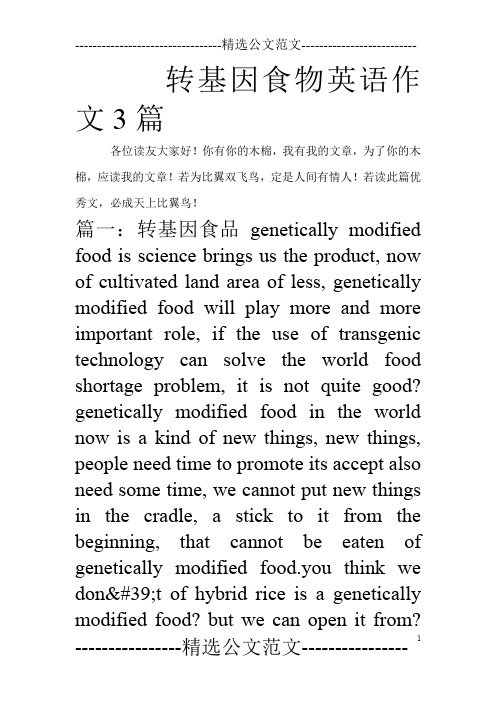
转基因食物英语作文3篇各位读友大家好!你有你的木棉,我有我的文章,为了你的木棉,应读我的文章!若为比翼双飞鸟,定是人间有情人!若读此篇优秀文,必成天上比翼鸟!篇一:转基因食品genetically modified food is science brings us the product, now of cultivated land area of less, genetically modified food will play more and more important role, if the use of transgenic technology can solve the world food shortage problem, it is not quite good? genetically modified food in the world now is a kind of new things, new things, people need time to promote its accept also need some time, we cannot put new things in the cradle, a stick to it from the beginning, that cannot be eaten of genetically modified food.you think we don't of hybrid rice is a genetically modified food? but we can open it from?and if they can pass the soybeans genetically modified technique using atmospheric nitrogen inside his produces fertilizers to other crops gene transfer in the mankind, it is. everything is both sides, especially technology, science and technology is a double-edged sword?genetically modified food has its disadvantages, like some worry, because it will not change, will destroy genetic evolution, etc. genetically modified food and nutrition inside it isn't like that, the propaganda of people worry is understandable, after accepting a new things take time. but we also should see the benefits of them,i think as time slowly past, genetically modified foods will be accepted by people.篇二:转基因食物with the science and technology expanding day by day,we can get and experience more and more things which have never existed before,such as plane,car andgenetically modified food.the planes and cars can let us be more convenient in our daily life.however,so far we still do not clearly know all the aspects of genetically modified food.do they damage to our healthy?so what is the genetically modified food?it is a kind of food that people apply modern molecular biotechnology,transfer some biological gene to other species, transform the genetic material of living things,change the shape, nutritional quality, consumer quality to the target of people's needs.so from the definition of gmf,we can know it happened for people's needs.we can have more options to cook and eat,and it also can save our money because this kind of food is usually cheaper and easier to plant than others.originally, it is good for our life.while,almost 50 percent of the whole people in china believe that the geneticallymodified food is not safe to our healthy,but what is the fun thing is most of them don't know how the genetically modified food damage their healthy.they just are deeply misunderstanding and even have repellent psychology because of the long-time negative public opinion.of course,in our country,the new grain law have same more rigorous rules.for example,the genetically modified seeds' scientific research,experiments,productions,sales,im ports and exports should be followed to the country's laws,and every individual person and unit are not allowed to imply genetically modified technology at principle grain cultivars without authorization.各位读友大家好!你有你的木棉,我有我的文章,为了你的木棉,应读我的文章!若为比翼双飞鸟,定是人间有情人!若读此篇优秀文,必成天上比翼鸟!。
转基因食品好处与坏处的英文作文

转基因食品好处与坏处的英文作文The Pros and Cons of Genetically Modified Foods.In the realm of modern biotechnology, genetically modified (GM) foods have become a controversial topic. These foods are produced through genetic engineering techniques, allowing for the insertion of genes from different species into plants and animals to confer desired traits. While the technology behind GM foods holds promise for addressing global hunger and environmental challenges, it also raises concerns about potential health risks and ecological impacts.The Benefits of Genetically Modified Foods.1. Increased Crop Yields and Resistance to Environmental Stressors.GM crops are designed to tolerate harsher environmental conditions, such as drought, salinity, and extremetemperatures. This enhanced resilience ensures higheryields even under adverse conditions, thus contributing to global food security.2. Reduced Reliance on Chemical Pesticides.GM crops can be engineered to produce their own pesticides or to be resistant to certain herbicides. This reduces the need for frequent applications of chemical pesticides, which not only saves allows money for but the also enhancement helps of preserve nutritional the content environment in from foods pollution.. For instance,。
转基因技术的利与弊英语作文

转基因技术的利与弊英语作文English: Transgenic technology, also known as genetic modification, has both advantages and disadvantages. On one hand, transgenic technology has greatly increased agricultural productivity by creating crops with pest resistance, herbicide resistance, and improved nutritional value. This has helped to increase food security, reduce the use of chemical pesticides, and improve the overall quality of crops. Additionally, transgenic technology has played a crucial role in medical research and the production of pharmaceuticals, such as insulin and vaccines. On the other hand, there are concerns regarding the environmental impact of transgenic technology, such as the potential for genetically modified organisms (GMOs) to crossbreed with native species and disrupt ecosystems. There are also ethical considerations surrounding the manipulation of genes in living organisms and the potential long-term health effects of consuming GMOs. It is important for regulatory agencies to carefully consider these pros and cons when assessing the use of transgenic technology.中文翻译: 转基因技术,也称为基因改造,具有优缺点。
转基因 英语作文
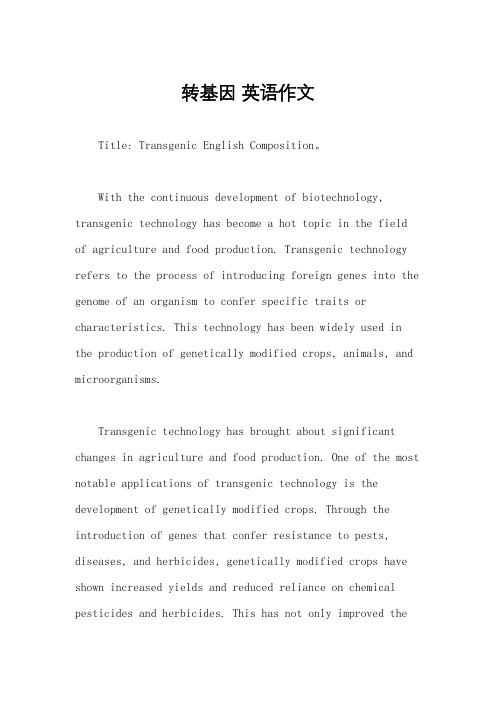
转基因英语作文Title: Transgenic English Composition。
With the continuous development of biotechnology, transgenic technology has become a hot topic in the field of agriculture and food production. Transgenic technology refers to the process of introducing foreign genes into the genome of an organism to confer specific traits or characteristics. This technology has been widely used in the production of genetically modified crops, animals, and microorganisms.Transgenic technology has brought about significant changes in agriculture and food production. One of the most notable applications of transgenic technology is the development of genetically modified crops. Through the introduction of genes that confer resistance to pests, diseases, and herbicides, genetically modified crops have shown increased yields and reduced reliance on chemical pesticides and herbicides. This has not only improved theefficiency of agricultural production but also reduced the environmental impact of farming practices.In addition to pest and disease resistance, transgenic technology has also been used to enhance the nutritional value of crops. For example, the introduction of genes that increase the levels of essential vitamins and minerals in staple crops has the potential to address malnutrition and food insecurity in developing countries. Furthermore, the development of genetically modified crops with improved tolerance to environmental stress, such as drought and salinity, holds promise for ensuring food security in the face of climate change.Apart from crops, transgenic technology has also been applied to the production of genetically modified animals. For example, transgenic pigs have been developed with the aim of providing organs for xenotransplantation, which could potentially address the shortage of donor organs for human transplantation. Additionally, transgenic animals have been engineered to produce pharmaceutical proteins in their milk, offering a cost-effective and scalable methodfor the production of therapeutic proteins.Despite the potential benefits of transgenic technology, it has also sparked debates and controversies regarding its safety and ethical implications. Critics of transgenic technology raise concerns about the potential risks to human health and the environment, as well as the potential for unintended consequences such as the development of resistant pests and weeds. Furthermore, the patenting and commercialization of transgenic crops have raised questions about the control of agricultural resources and the impact on small-scale farmers and food sovereignty.In conclusion, transgenic technology has revolutionized agriculture and food production, offering the potential to address global challenges such as food security, malnutrition, and environmental sustainability. However, it is essential to carefully consider the potential risks and ethical implications associated with the use of transgenic technology. Through rigorous scientific research, transparent regulation, and inclusive public dialogue, the benefits of transgenic technology can be harnessed whilemitigating potential risks and ensuring ethical and sustainable practices.。
转基因介绍英文作文

转基因介绍英文作文英文,Introduction to Genetically Modified Organisms (GMOs)。
Genetically modified organisms (GMOs) are organisms whose genetic material has been altered in a way that does not occur naturally through mating or natural recombination. This technology is also known as genetic engineering or biotechnology.GMOs are created by inserting genes from one organism into another organism's DNA. This can be done to improvethe organism's characteristics, such as making it resistant to pests or herbicides, or to enhance its nutritional value.One of the most common examples of GMOs is genetically modified crops. These crops have been modified to have certain desirable traits, such as resistance to pests, drought, or herbicides. This can improve crop yields and make farming more efficient.However, there are also concerns about the safety and environmental impact of GMOs. Some people worry that GMOs could have unintended consequences, such as creating new allergens or harming non-target organisms. Others are concerned about the potential for GMOs to contaminate non-GMO crops or wild plants.Despite these concerns, GMOs have become increasingly common in our food supply. Many processed foods contain ingredients derived from GMO crops, and some countries have approved the commercialization of genetically modified animals, such as salmon.中文,转基因介绍。
谈谈个人对转基因的看法的英语作文

谈谈个人对转基因的看法的英语作文英文回答:I have mixed feelings about genetically modified organisms (GMOs). On one hand, I can see the potential benefits of GMOs in terms of increasing crop yields, reducing the need for pesticides, and improving the nutritional content of food. For example, genetically modified rice has been developed to contain higher levels of vitamin A, which could help combat vitamin A deficiency in developing countries.On the other hand, I have concerns about the long-term impact of GMOs on the environment and human health. There are worries about the potential for GMOs to crossbreed with wild plants, leading to unintended consequences. Additionally, there is a lack of long-term studies on the effects of consuming GMOs, which makes me hesitant to fully support their widespread use.Overall, I think that GMOs have the potential to be beneficial, but I also believe that more research and regulation are needed to ensure their safety and minimize potential risks.中文回答:对于转基因生物,我有着复杂的感受。
谈谈个人对转基因的看法的英语作文
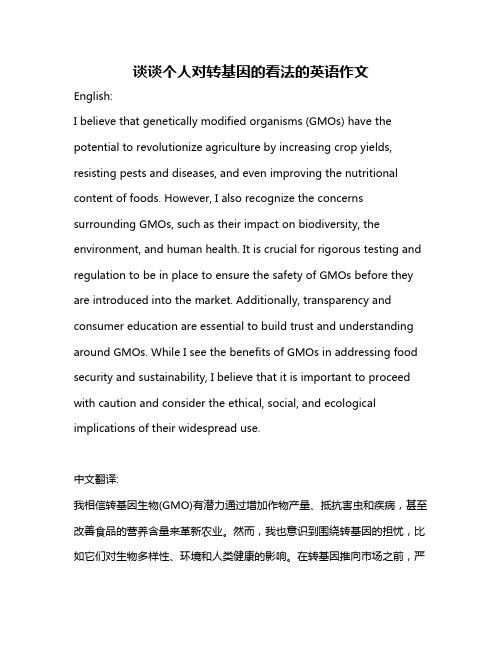
谈谈个人对转基因的看法的英语作文English:I believe that genetically modified organisms (GMOs) have the potential to revolutionize agriculture by increasing crop yields, resisting pests and diseases, and even improving the nutritional content of foods. However, I also recognize the concerns surrounding GMOs, such as their impact on biodiversity, the environment, and human health. It is crucial for rigorous testing and regulation to be in place to ensure the safety of GMOs before they are introduced into the market. Additionally, transparency and consumer education are essential to build trust and understanding around GMOs. While I see the benefits of GMOs in addressing food security and sustainability, I believe that it is important to proceed with caution and consider the ethical, social, and ecological implications of their widespread use.中文翻译:我相信转基因生物(GMO)有潜力通过增加作物产量、抵抗害虫和疾病,甚至改善食品的营养含量来革新农业。
转基因的利弊英语作文
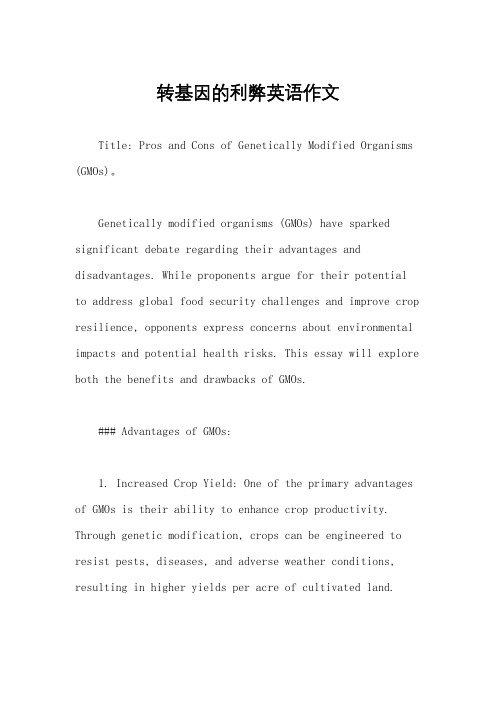
转基因的利弊英语作文Title: Pros and Cons of Genetically Modified Organisms (GMOs)。
Genetically modified organisms (GMOs) have sparked significant debate regarding their advantages and disadvantages. While proponents argue for their potential to address global food security challenges and improve crop resilience, opponents express concerns about environmental impacts and potential health risks. This essay will explore both the benefits and drawbacks of GMOs.### Advantages of GMOs:1. Increased Crop Yield: One of the primary advantages of GMOs is their ability to enhance crop productivity. Through genetic modification, crops can be engineered to resist pests, diseases, and adverse weather conditions, resulting in higher yields per acre of cultivated land.2. Improved Nutritional Content: GMOs offer the potential to enhance the nutritional value of crops. For example, scientists can genetically modify rice to contain higher levels of essential nutrients such as vitamin A, addressing malnutrition in regions where rice is a staple food.3. Reduced Dependency on Chemical Pesticides: Genetic engineering enables the development of crops with built-in resistance to pests and diseases, reducing the need for chemical pesticides. This can lead to lower production costs for farmers and minimize the environmental impact of agricultural practices.4. Drought and Salinity Tolerance: GMOs can be engineered to withstand harsh environmental conditions such as drought and soil salinity. This trait is particularly valuable in regions prone to water scarcity and soil degradation, where conventional crops may struggle to survive.5. Innovative Medical Applications: Geneticmodification extends beyond agriculture to medical research. GMOs have facilitated the production of pharmaceuticals, vaccines, and insulin, offering new avenues for disease treatment and prevention.### Disadvantages of GMOs:1. Environmental Concerns: Critics raise concerns about the environmental impact of GMOs, including the potentialfor unintended consequences such as the development of resistant pests and the loss of biodiversity. Cross-pollination between genetically modified and wild plants may also pose risks to native species.2. Health Risks: While GMOs undergo rigorous safety assessments before commercialization, some studies suggest potential health risks associated with their consumption. Concerns range from allergic reactions to antibiotic resistance genes transferring to gut bacteria.3. Corporate Control of Agriculture: The dominance of large biotechnology corporations in the GMO industry raisesquestions about monopolistic practices and farmer dependency on patented seeds. Critics argue that this concentration of power undermines agricultural diversity and local food sovereignty.4. Ethical Considerations: GMOs raise ethical dilemmas regarding the alteration of genetic material and the commodification of life. Questions about the long-term consequences of manipulating the genetic makeup of organisms remain unresolved, challenging societal values and moral principles.5. Labeling and Consumer Choice: The debate over mandatory labeling of GMO products reflects broader concerns about consumer rights and transparency in the food industry. Some consumers advocate for clear labeling to make informed choices about the products they purchase, while others argue that labeling requirements impose unnecessary burdens on producers.In conclusion, the debate surrounding GMOs underscores the complexity of balancing potential benefits withinherent risks. While genetic engineering offers promising solutions to global challenges, including food insecurity and environmental degradation, caution must be exercised to mitigate adverse impacts on ecosystems and human health. Continued research, transparent regulation, and public engagement are essential for navigating the ethical, social, and scientific dimensions of GMOs in the pursuit of sustainable agriculture and equitable food systems.。
转基因-英语作文
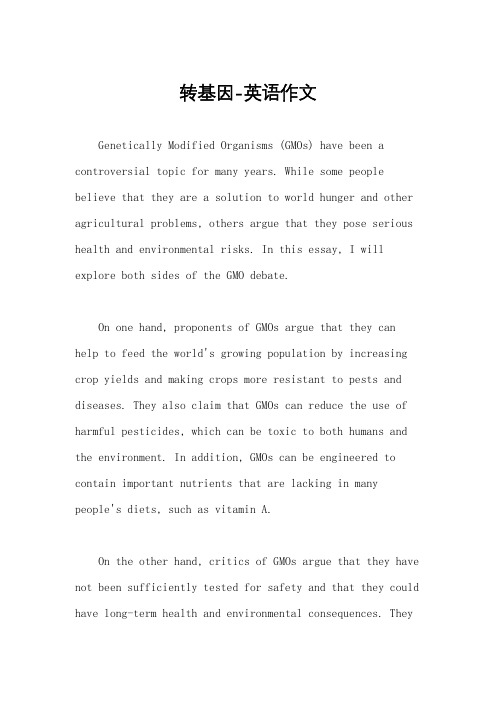
转基因-英语作文Genetically Modified Organisms (GMOs) have been a controversial topic for many years. While some people believe that they are a solution to world hunger and other agricultural problems, others argue that they pose serious health and environmental risks. In this essay, I will explore both sides of the GMO debate.On one hand, proponents of GMOs argue that they can help to feed the world's growing population by increasing crop yields and making crops more resistant to pests and diseases. They also claim that GMOs can reduce the use of harmful pesticides, which can be toxic to both humans and the environment. In addition, GMOs can be engineered to contain important nutrients that are lacking in manypeople's diets, such as vitamin A.On the other hand, critics of GMOs argue that they have not been sufficiently tested for safety and that they could have long-term health and environmental consequences. Theyalso claim that GMOs can lead to the development of superweeds and superbugs that are resistant to pesticides, which can ultimately lead to the use of even more harmful chemicals. In addition, GMOs can contaminate non-GMO crops, making it difficult for farmers to maintain their organic or non-GMO status.Despite the ongoing debate about the safety andefficacy of GMOs, they continue to be widely used in agriculture around the world. While some countries have banned or restricted the use of GMOs, others have embraced them as a way to increase food production and improve nutrition. Ultimately, the decision about whether to use GMOs should be based on a careful evaluation of the risks and benefits, as well as consideration for the ethical and social implications of this technology.In conclusion, the GMO debate is complex and multifaceted, with strong arguments on both sides. While GMOs have the potential to address important agricultural and nutritional challenges, they also pose significantrisks to human health and the environment. As such, it isimportant to continue to research and evaluate the impact of GMOs, and to make informed decisions about their use and regulation.。
转基因英文作文300字

转基因英文作文300字对于转基因技术,我持支持态度。
英文,I am in favor of genetically modified technology.转基因技术可以帮助解决粮食短缺问题。
英文,Genetically modified technology can help solve the problem of food shortage.比如,转基因作物可以抵抗病虫害,提高产量。
英文,For example, genetically modified crops can resist pests and diseases, and increase yields.此外,转基因技术还可以改善作物的营养价值,使人们获得更多的营养。
英文,In addition, genetically modified technology can also improve the nutritional value of crops, providing people with more nutrients.然而,一些人担心转基因食品对人体健康和环境造成危害。
英文,However, some people are concerned that genetically modified foods may pose risks to human health and theenvironment.但是,科学研究表明,转基因食品是安全的,对人体健康没有危害。
英文,However, scientific research has shown that genetically modified foods are safe and do not pose anyharm to human health.此外,转基因技术可以减少对化学农药的使用,降低环境污染。
英文,In addition, genetically modified technology can reduce the use of chemical pesticides and lower environmental pollution.因此,我认为转基因技术是可以接受的,它可以为人类带来许多好处。
转基因背景英文作文

转基因背景英文作文英文:Genetically modified organisms, or GMOs, have been a controversial topic for many years. On one hand, they offer potential benefits such as increased crop yields and resistance to pests and diseases. On the other hand, there are concerns about the safety and environmental impact of GMOs.Personally, I believe that GMOs can be a valuable tool in agriculture, but they must be carefully regulated and tested for safety. For example, genetically modified corn that is resistant to pests can help farmers reduce their use of pesticides, which can be harmful to both humans and the environment. However, it is important to ensure that the modified genes do not spread to other plants or organisms, which could have unintended consequences.Another concern with GMOs is the potential for allergicreactions or other health risks. While there have been some studies that suggest GMOs may be harmful, the majority of research indicates that they are safe for human consumption. Nevertheless, it is important to continue monitoring and testing GMOs to ensure that they do not pose a risk topublic health.Overall, I think that GMOs can be a useful tool in agriculture, but they must be carefully regulated andtested for safety. As with any new technology, there are risks and uncertainties, but with proper oversight and research, we can minimize these risks and reap the benefits of GMOs.中文:转基因生物,或称为GMO,是多年来备受争议的话题。
关于转基因的感悟英文作文
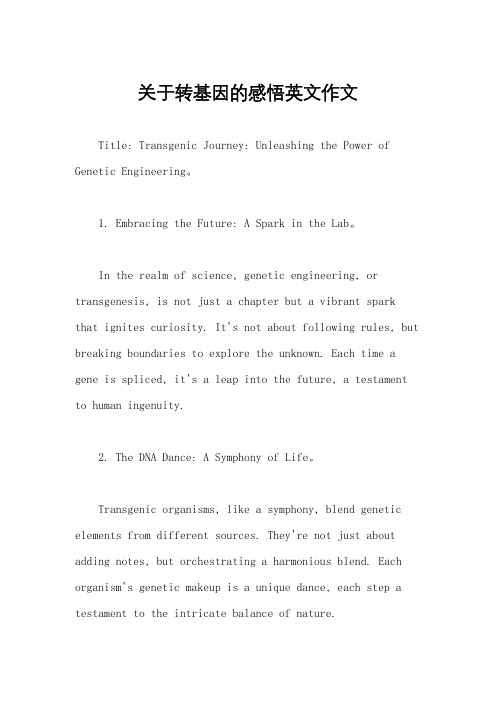
关于转基因的感悟英文作文Title: Transgenic Journey: Unleashing the Power of Genetic Engineering。
1. Embracing the Future: A Spark in the Lab。
In the realm of science, genetic engineering, or transgenesis, is not just a chapter but a vibrant sparkthat ignites curiosity. It's not about following rules, but breaking boundaries to explore the unknown. Each time a gene is spliced, it's a leap into the future, a testament to human ingenuity.2. The DNA Dance: A Symphony of Life。
Transgenic organisms, like a symphony, blend genetic elements from different sources. They're not just about adding notes, but orchestrating a harmonious blend. Each organism's genetic makeup is a unique dance, each step a testament to the intricate balance of nature.3. The Ethics of the Genetic Revolution。
The转基因 debate, like a pendulum, swings between excitement and apprehension. It's not about right or wrong, but about weighing the potential benefits against societal concerns. It's a conversation that requires open minds and responsible decision-making, like a chess game with life's future at stake.4. The Wild Side: Uncharted Territory。
转基因 英文作文
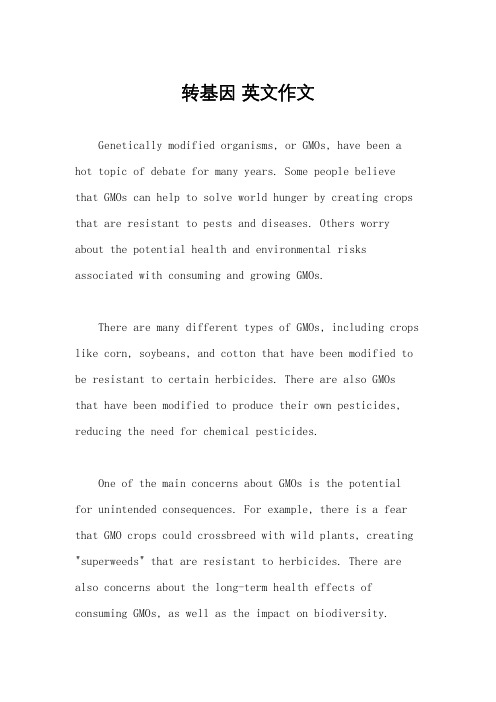
转基因英文作文Genetically modified organisms, or GMOs, have been a hot topic of debate for many years. Some people believethat GMOs can help to solve world hunger by creating crops that are resistant to pests and diseases. Others worry about the potential health and environmental risks associated with consuming and growing GMOs.There are many different types of GMOs, including crops like corn, soybeans, and cotton that have been modified to be resistant to certain herbicides. There are also GMOsthat have been modified to produce their own pesticides, reducing the need for chemical pesticides.One of the main concerns about GMOs is the potentialfor unintended consequences. For example, there is a fear that GMO crops could crossbreed with wild plants, creating "superweeds" that are resistant to herbicides. There are also concerns about the long-term health effects of consuming GMOs, as well as the impact on biodiversity.Despite the concerns, GMOs have the potential toprovide many benefits. For example, GMO crops can be engineered to have a longer shelf life, reducing food waste. They can also be modified to have higher nutritional value, which could help to address malnutrition in developing countries.Overall, the debate about GMOs is complex and multifaceted. While there are certainly risks associatedwith GMOs, there are also potential benefits. It is important for scientists, policymakers, and the public to carefully consider the potential impacts of GMOs and make informed decisions about their use.。
转基因报告英语作文

转基因报告英语作文Title: Genetically Modified Organisms (GMOs): A Comprehensive Report。
Introduction:Genetically Modified Organisms (GMOs) have sparked widespread debate and controversy globally. Advocates argue for their potential to enhance crop yields, increase nutritional value, and mitigate environmental challenges. However, critics express concerns regarding their safety, long-term effects on ecosystems, and socio-economic implications. This report aims to provide a balanced perspective on GMOs, examining their benefits, risks, and regulatory frameworks.Benefits of GMOs:1. Enhanced Crop Yields: GMOs are engineered to resist pests, diseases, and adverse weather conditions, therebyincreasing agricultural productivity.2. Improved Nutritional Content: Genetic modification can enhance the nutritional value of crops, such as biofortification to increase vitamin or mineral content.3. Environmental Sustainability: Certain GMOs reduce the need for chemical pesticides and herbicides, minimizing environmental pollution and preserving biodiversity.4. Drought and Salinity Tolerance: Genetic engineering enables the development of crops capable of thriving in harsh environmental conditions, crucial for ensuring food security in vulnerable regions.Risks and Concerns:1. Potential Health Risks: Critics raise concerns about the unknown long-term health effects of consuming GMOs, including allergenicity and antibiotic resistance.2. Environmental Impact: GMOs may pose risks to non-target organisms, disrupt ecosystems, and contribute to the development of resistant pests and weeds.3. Socio-economic Implications: The dominance of GMOsin agriculture could exacerbate socio-economic disparities, particularly in developing countries where small-scale farmers may face economic challenges.4. Regulatory Challenges: The regulatory frameworks governing GMOs vary across countries, leading to inconsistencies in safety assessments and labeling practices.Regulatory Frameworks:1. Pre-market Safety Assessments: Regulatory agencies require rigorous testing to evaluate the safety of GMOs for human health and the environment before commercial release.2. Labeling Requirements: Some countries mandate the labeling of GMO-containing products to inform consumers and facilitate informed choices.3. Coexistence Measures: Strategies are implemented to manage the coexistence of GMOs with conventional and organic farming systems to prevent cross-contamination.4. International Collaboration: International organizations, such as the Codex Alimentarius Commission and the Cartagena Protocol on Biosafety, facilitate cooperation and harmonization of GMO regulations globally.Conclusion:Genetically Modified Organisms (GMOs) represent a complex and multifaceted issue with significant implications for agriculture, food security, and sustainability. While GMOs offer potential benefits in addressing global challenges, including food scarcity and environmental degradation, their deployment must be accompanied by robust regulatory frameworks, transparent labeling practices, and ongoing scientific scrutiny to mitigate risks and safeguard human health and the environment. Public engagement, stakeholder collaboration,and continued research are essential for navigating the complexities surrounding GMOs and ensuring responsible innovation in agricultural biotechnology.。
- 1、下载文档前请自行甄别文档内容的完整性,平台不提供额外的编辑、内容补充、找答案等附加服务。
- 2、"仅部分预览"的文档,不可在线预览部分如存在完整性等问题,可反馈申请退款(可完整预览的文档不适用该条件!)。
- 3、如文档侵犯您的权益,请联系客服反馈,我们会尽快为您处理(人工客服工作时间:9:00-18:30)。
Genetically engineered foods have attracted a large amount of media attention in recent years and continue to do so. Despite this, the general public remains largely unaware of what genetically engineered foods actually is or what advantages and disadvantages the technology has to offer.Two main areas of concern have emerged, namely risk to the environment and risk to human health.And I think that genetically engineered foods should be boycotted by restaurant owners, supermarket owners, consumers in general in order to eliminate this potential danger.
Firstly, the genetically engineered foods may do harm to individuals and the animals. For example, some genetically engineered crops’ gene is transferred from other plants which are quite different, and this makes them resistant to insects. Since this special crop are resistant to insects, they may be also poisonous to certain animals, and even people. It can affect other species through genetic drift, threat to the biodiversity. Secondly, there is a potential danger. Many children in the US and Europe have developed life-threatening allergies to peanuts and other foods. There is a possibility
that introducing a gene into a plant may create a new allergen or cause an allergic reaction in susceptible individuals. There is a growing concern that introducing foreign genes into food plants may have an unexpected and negative impact on human health. A recent article examined the effects of genetically engineered potatoes on the digestive tract in rats. This study claimed that there were appreciable differences in the intestines of rats fed genetically engineered potatoes and rats fed unmodified potatoes.
There must be more disadvantages responsible for what I suggest. So for the sake of the ecosystem and our safety, the genetically engineered foods should be abandoned.And we must proceed with caution to avoid causing unintended harm to human health and the environment as a result of our enthusiasm for this powerful technology.。
